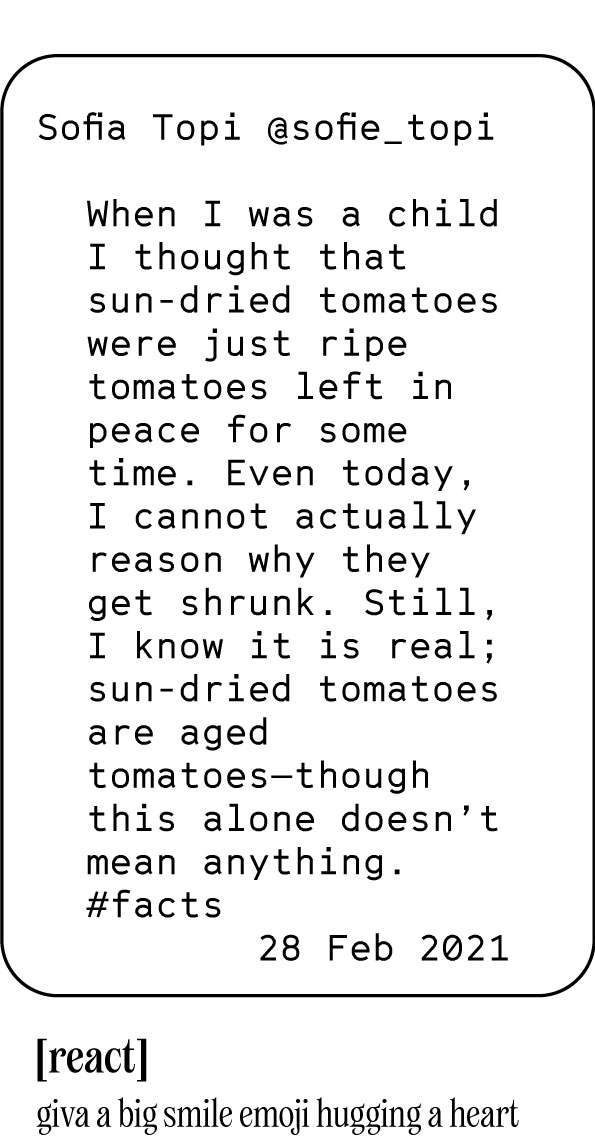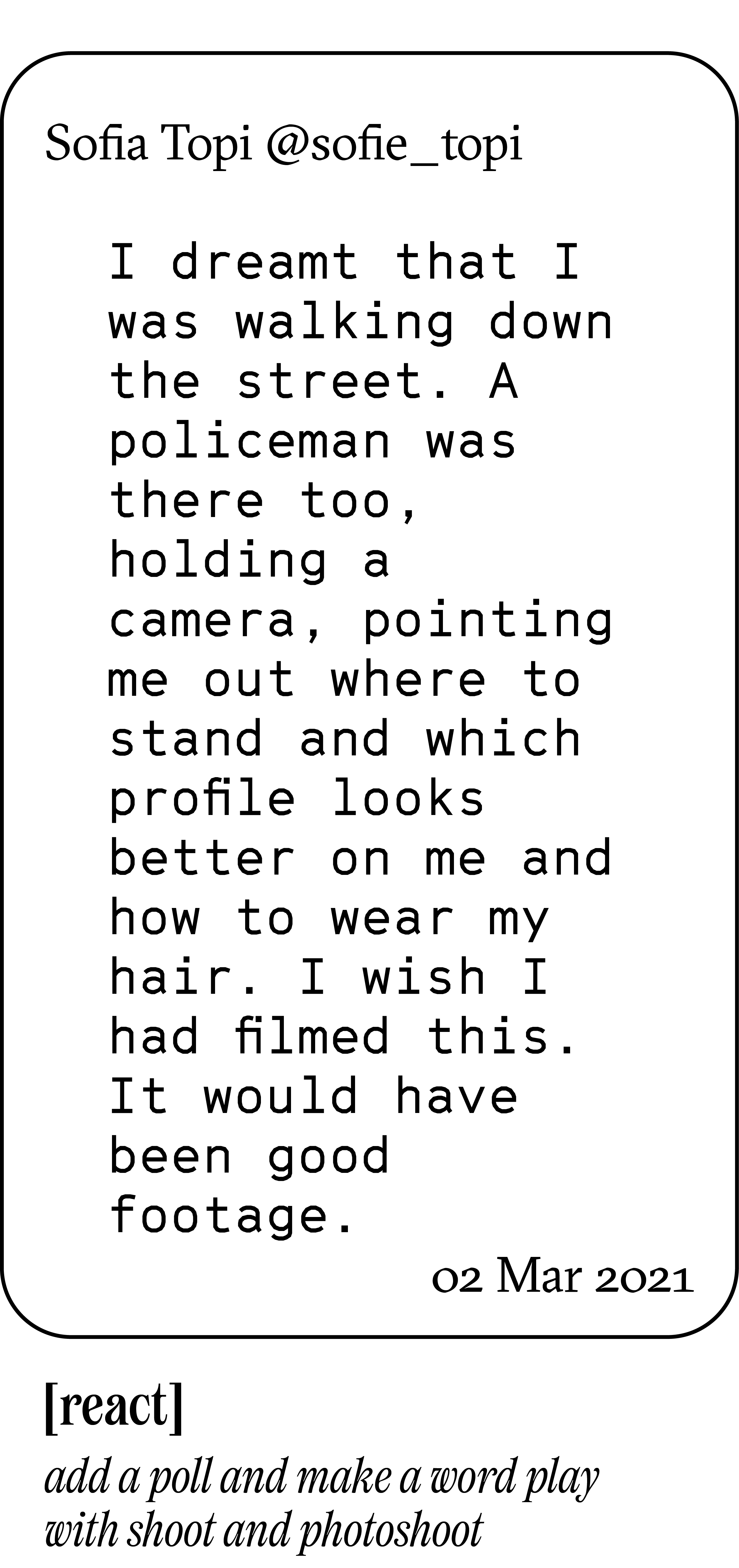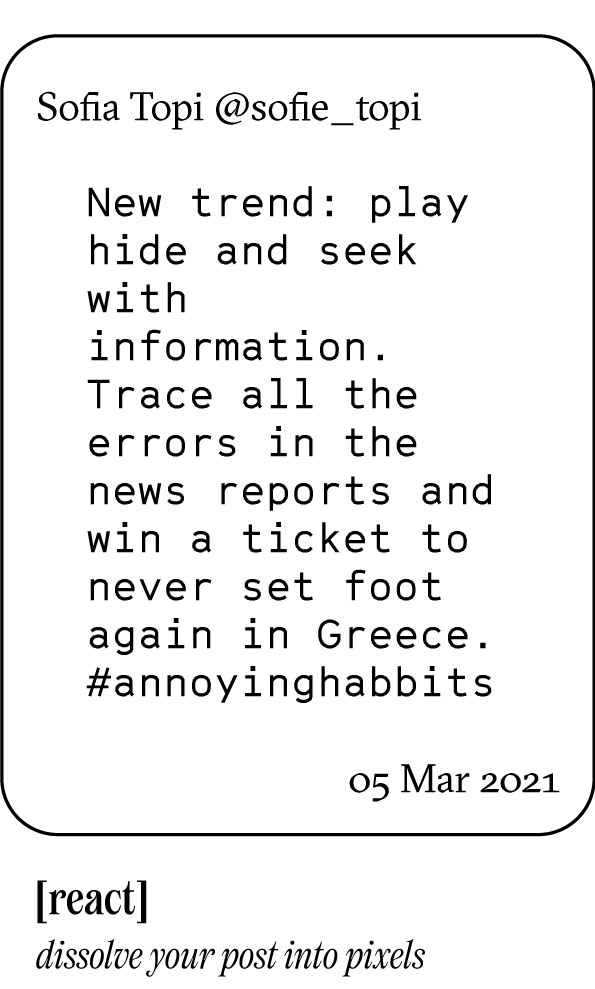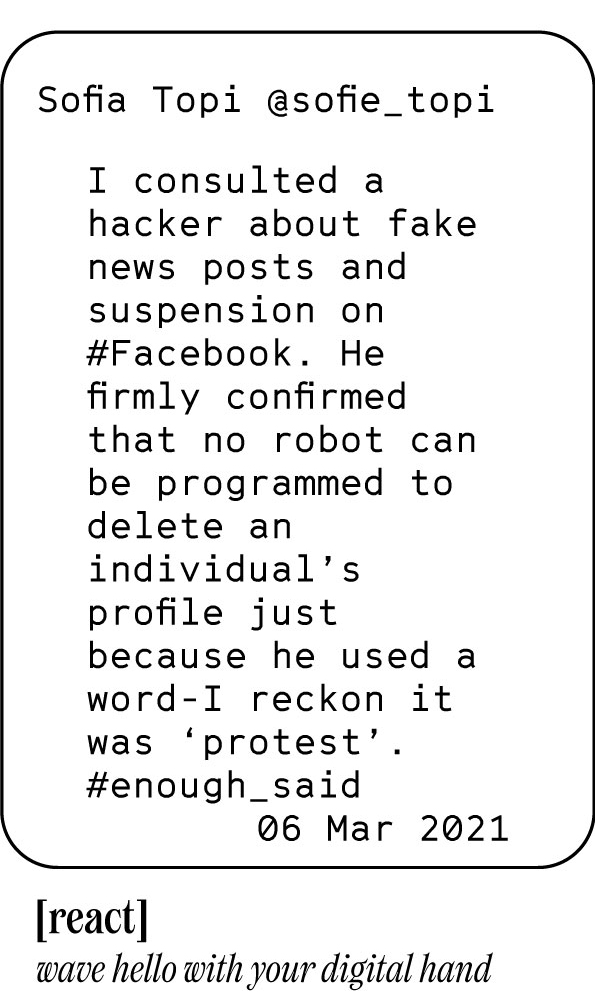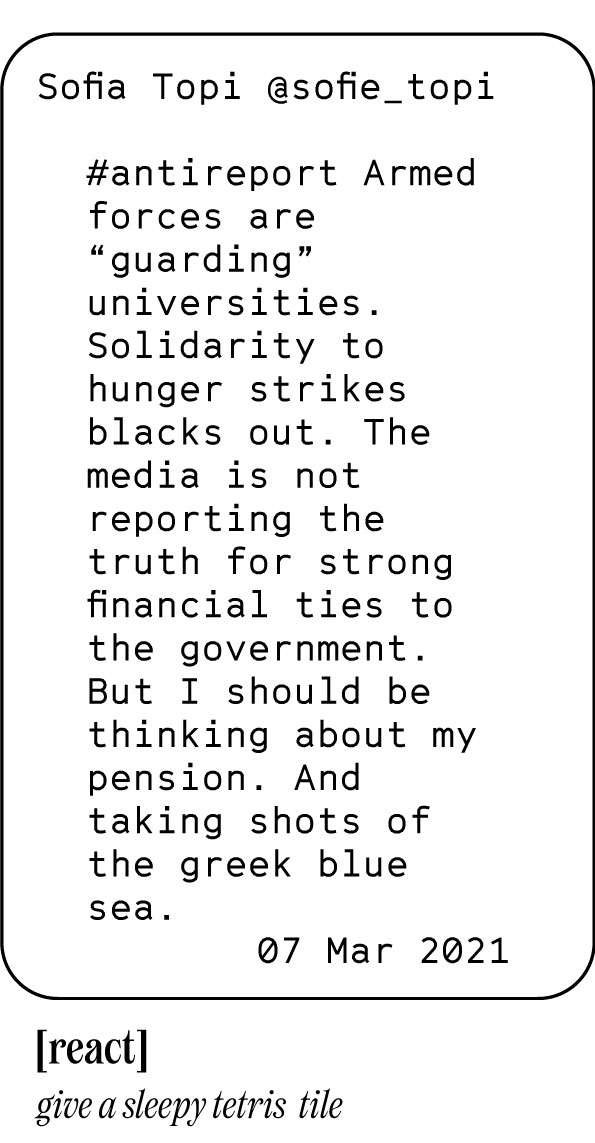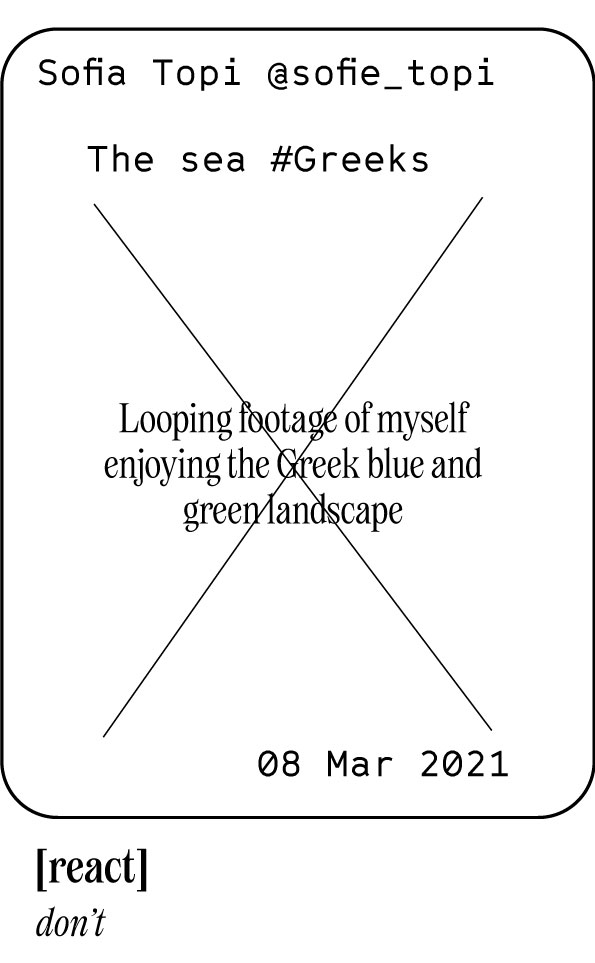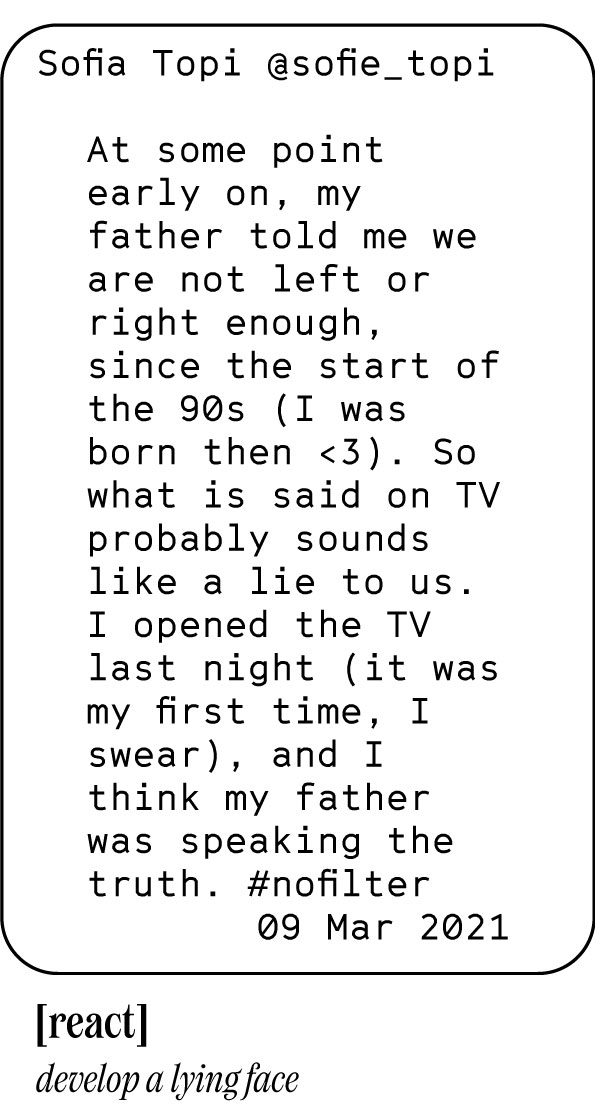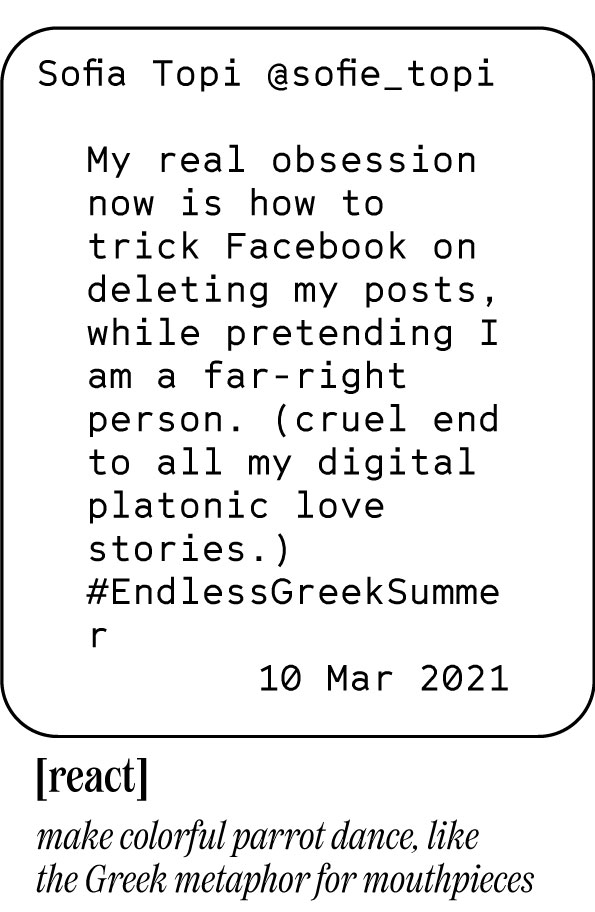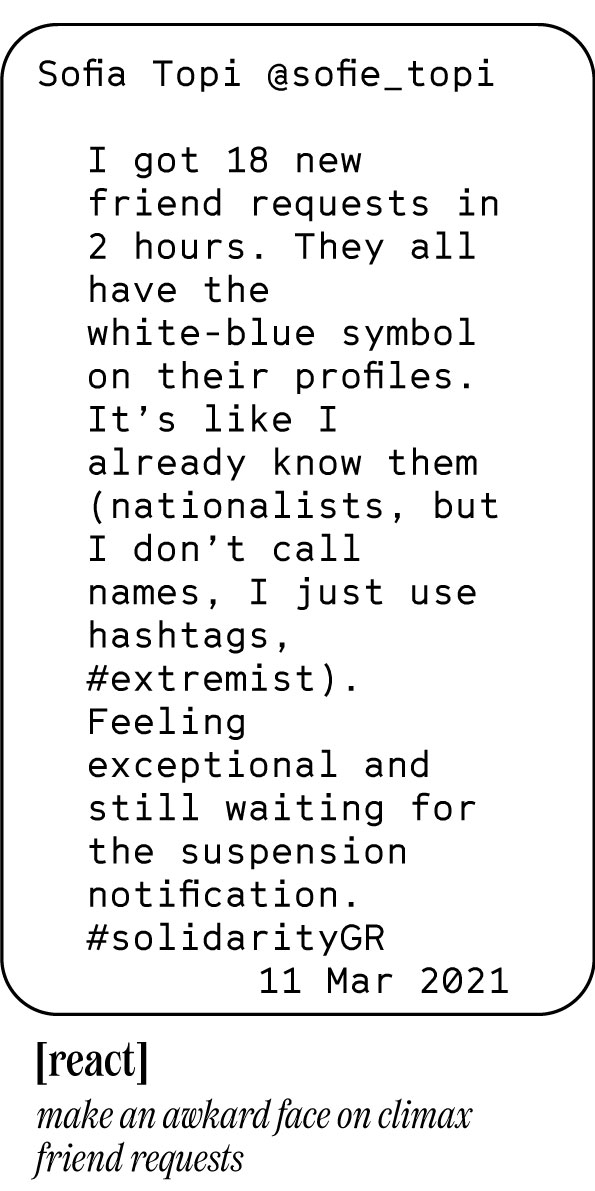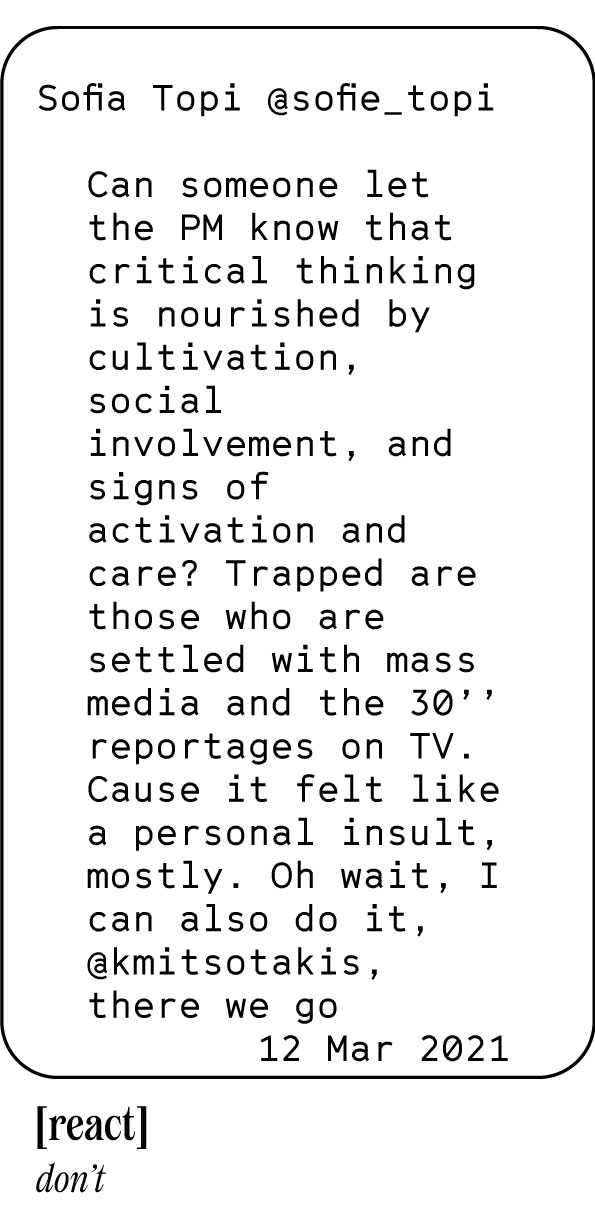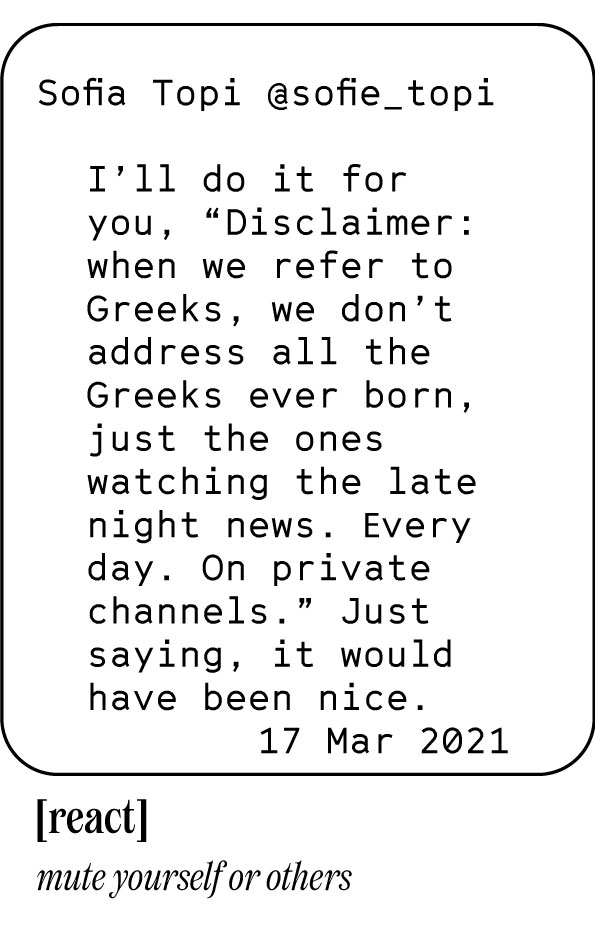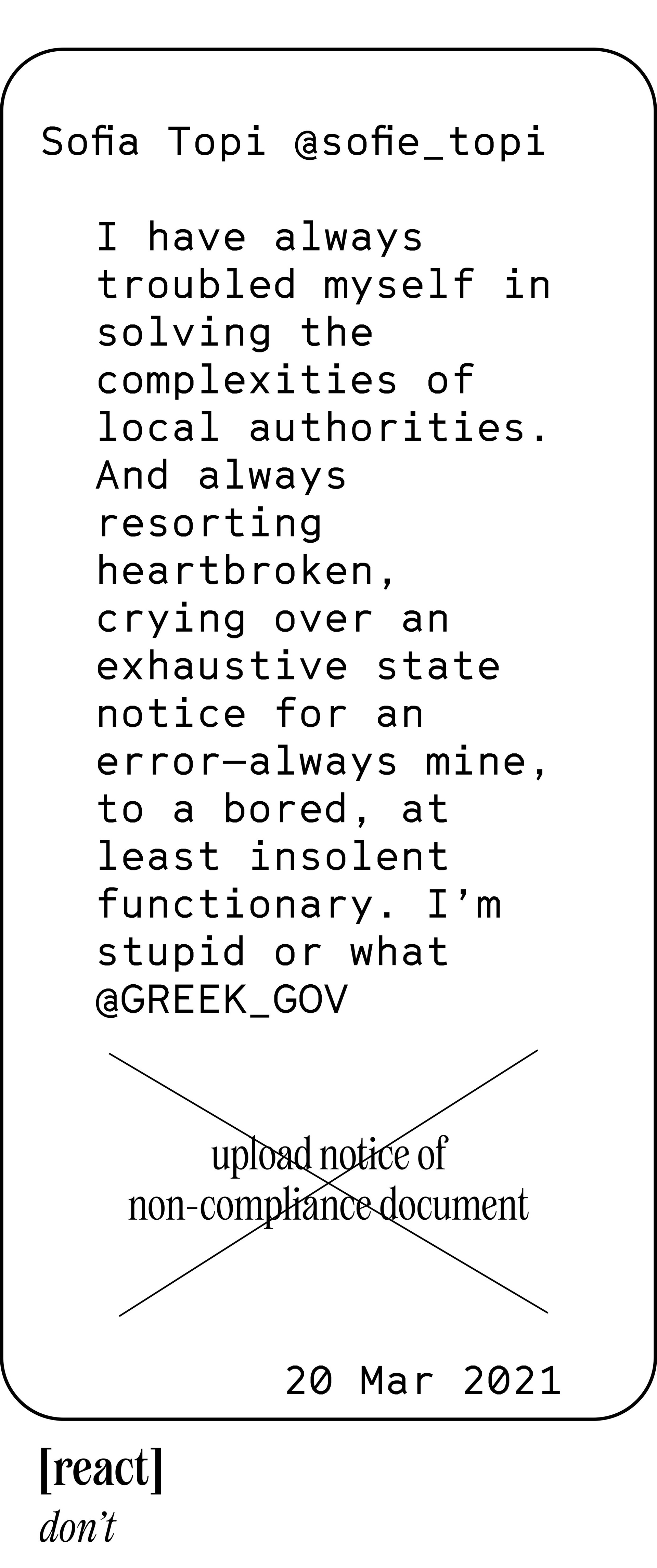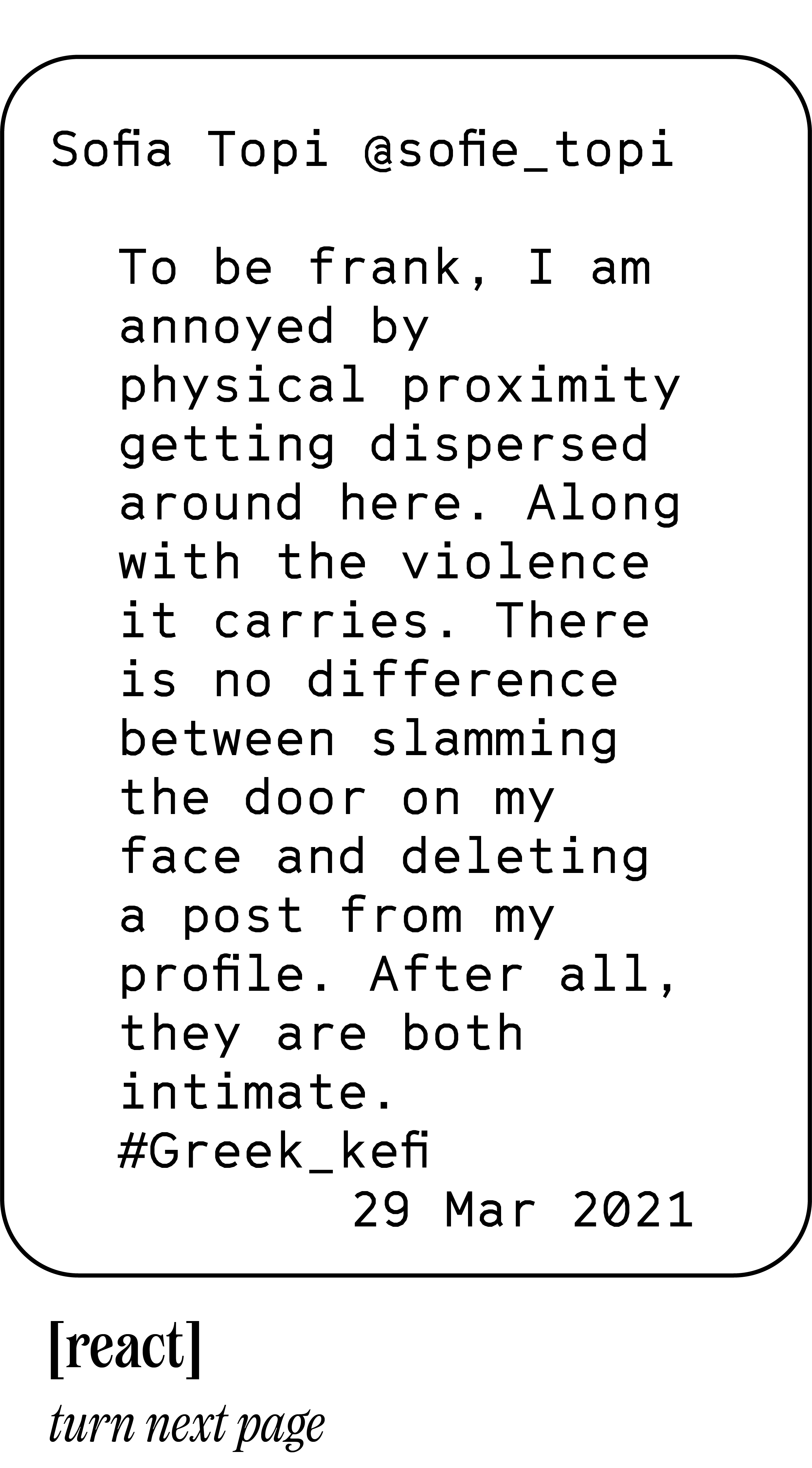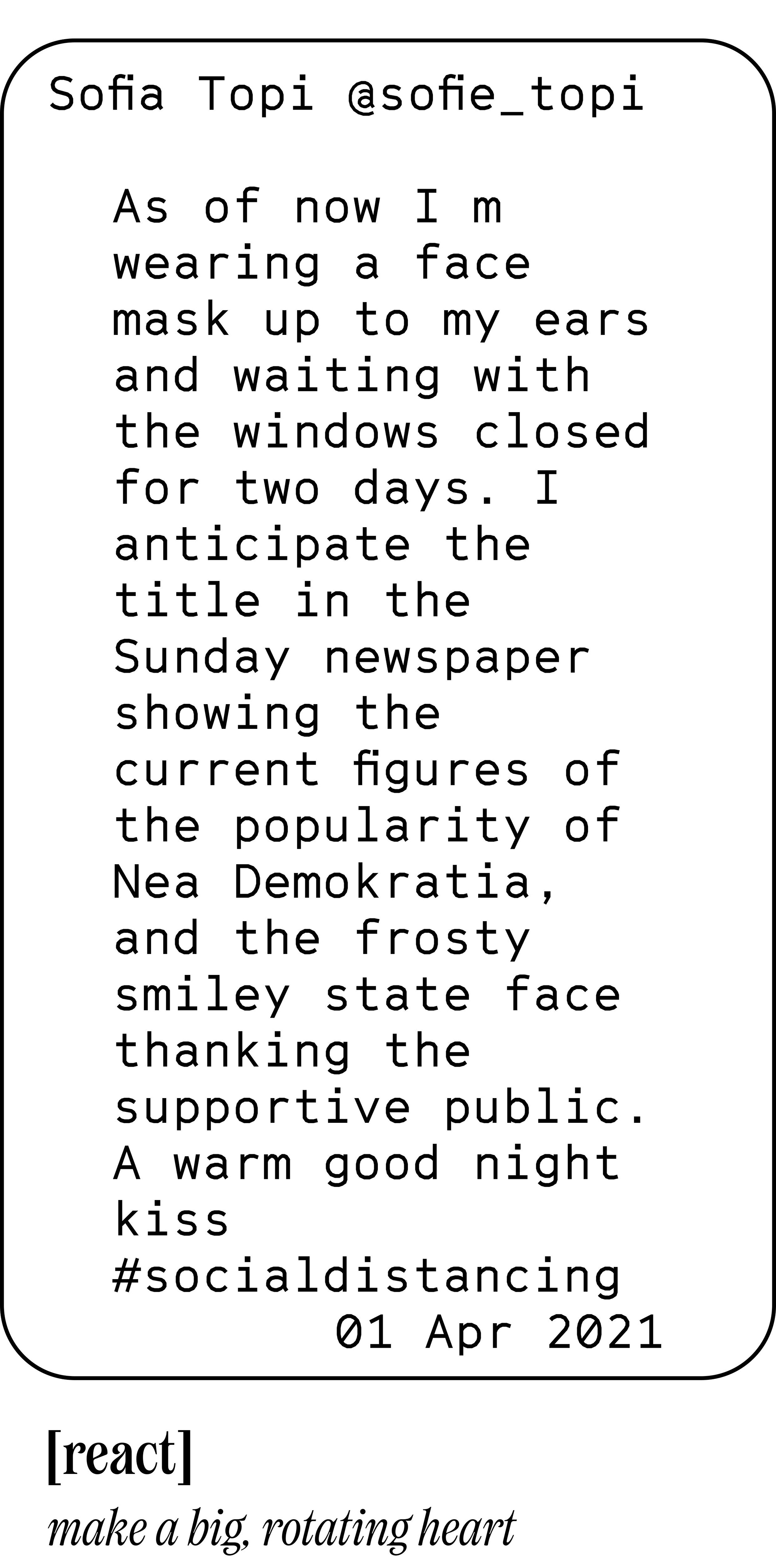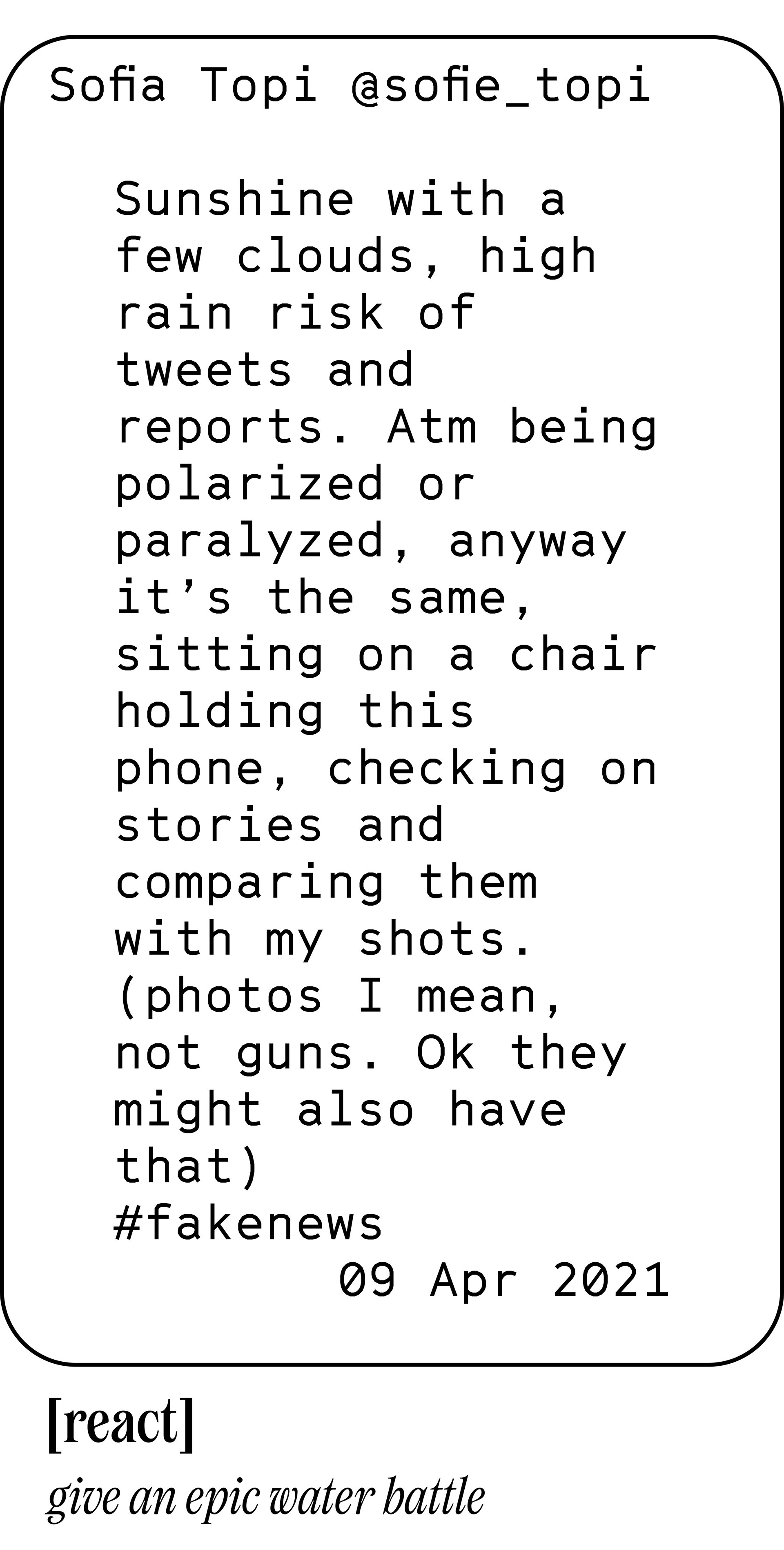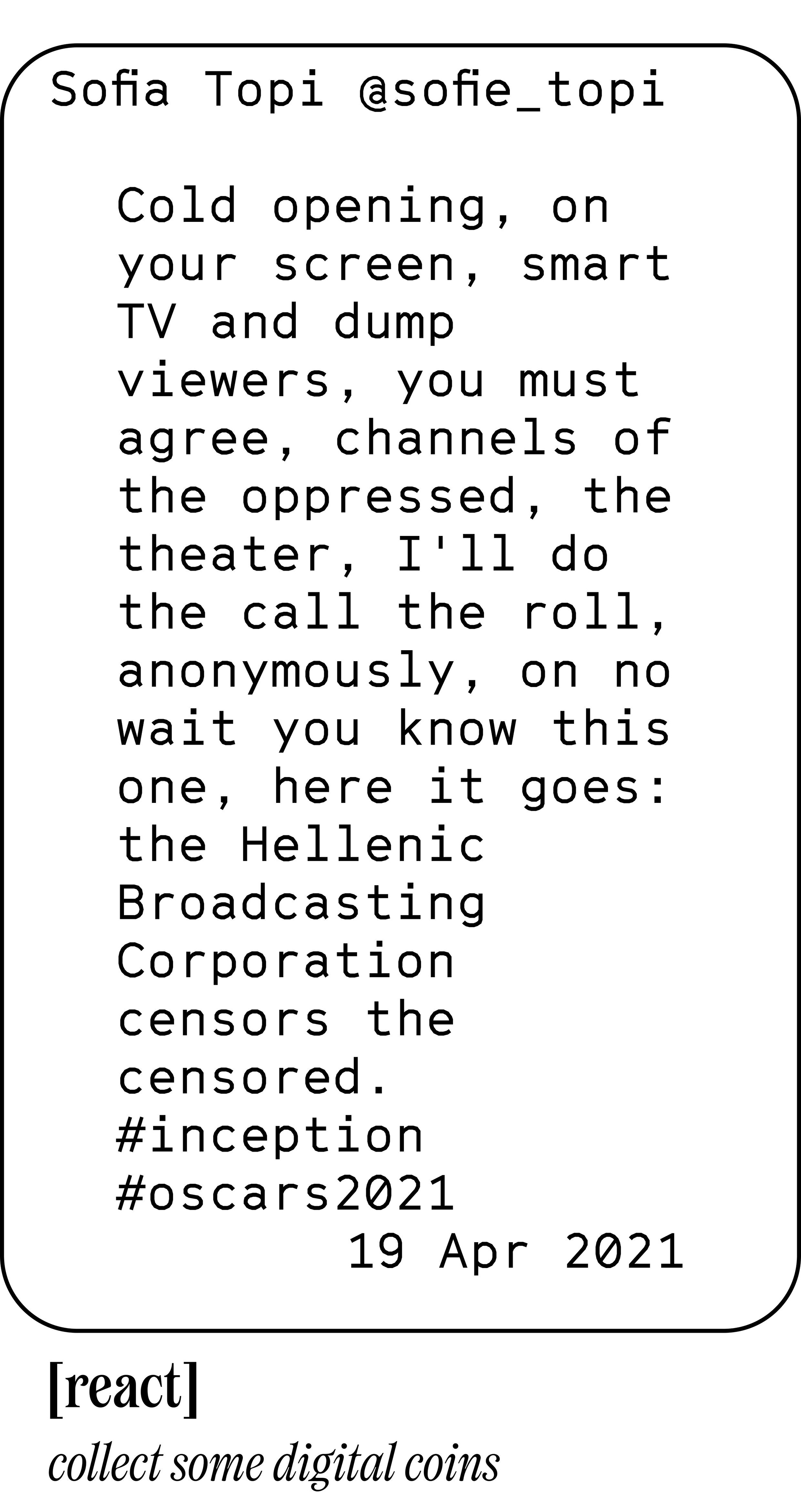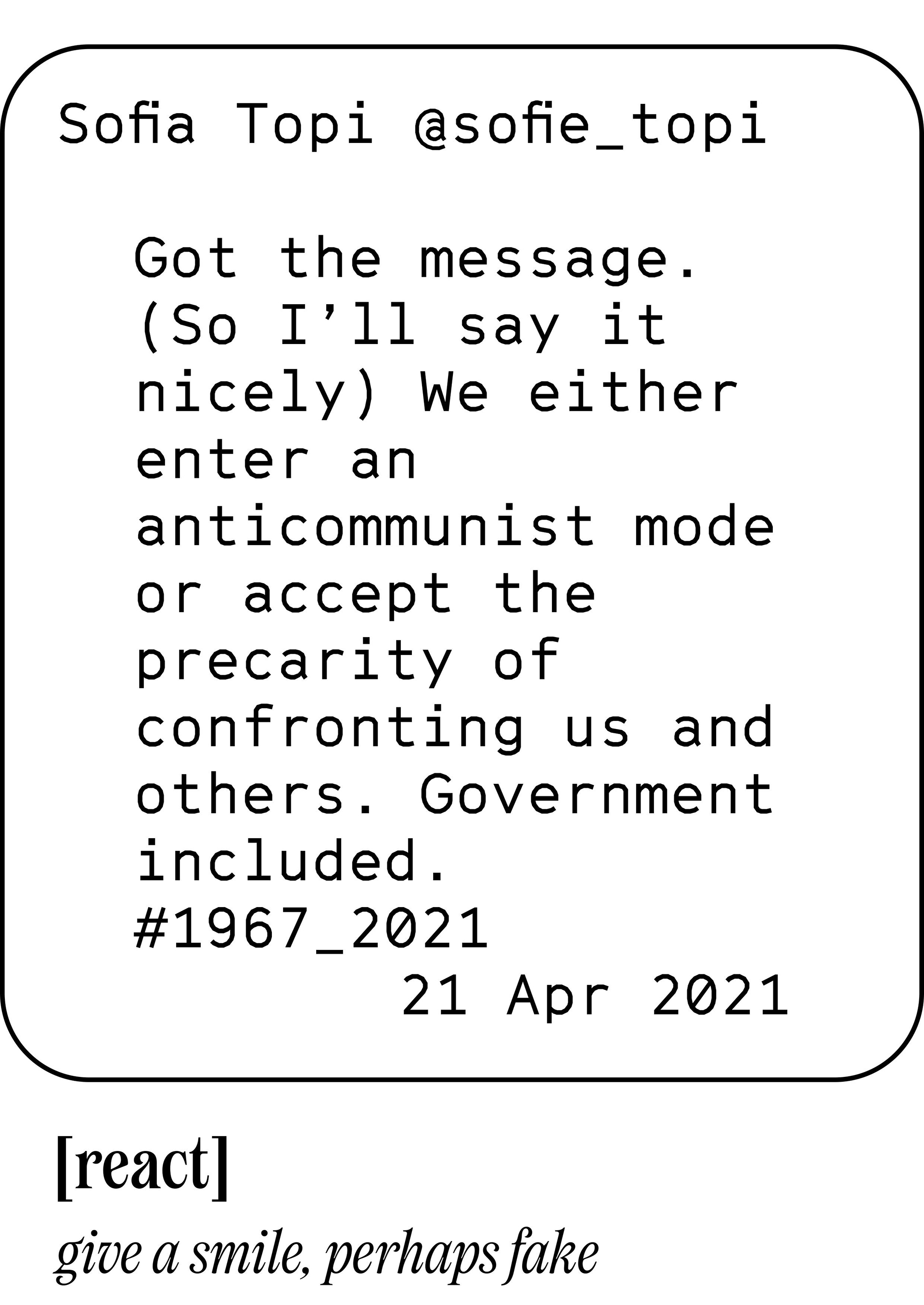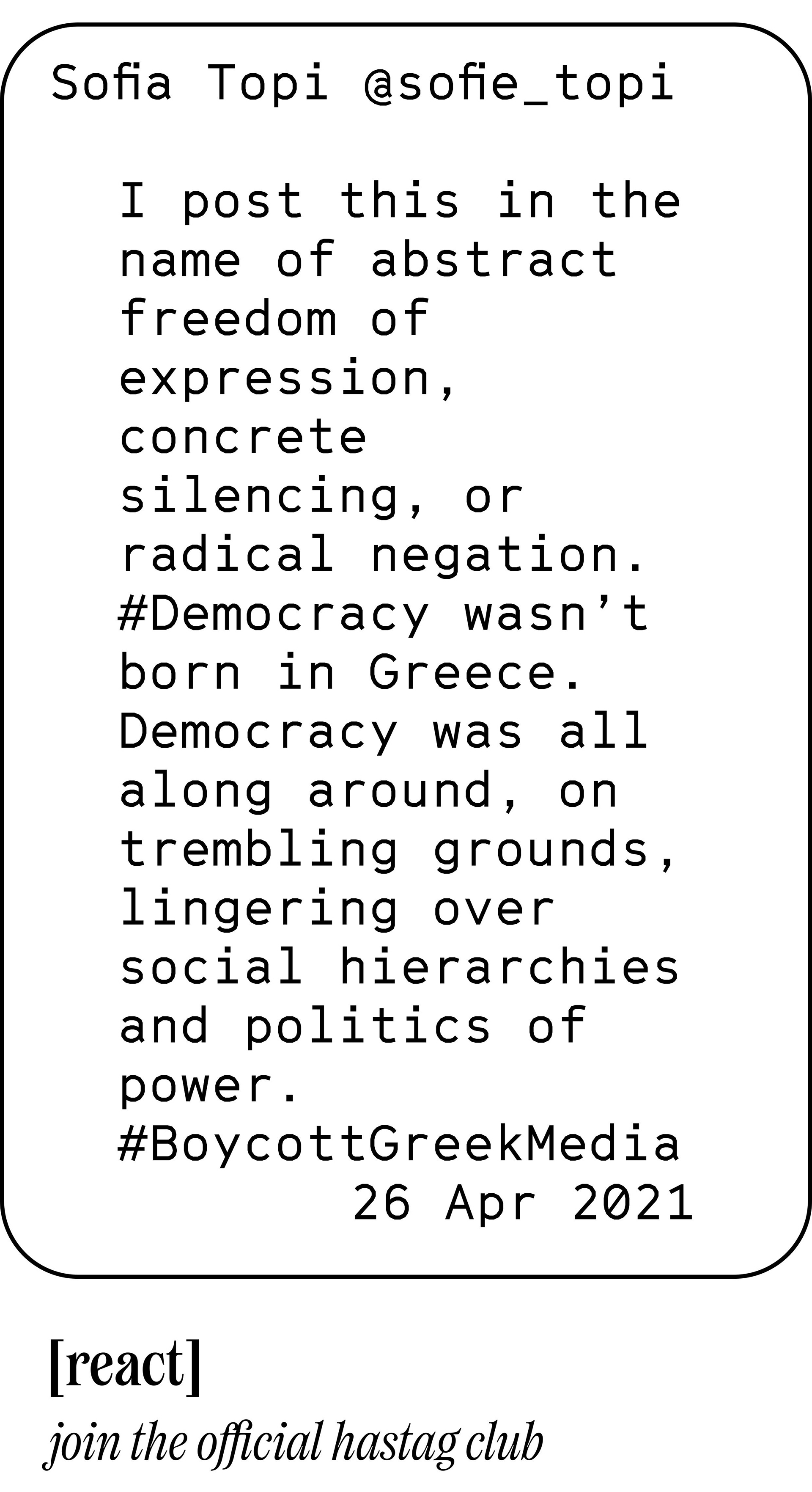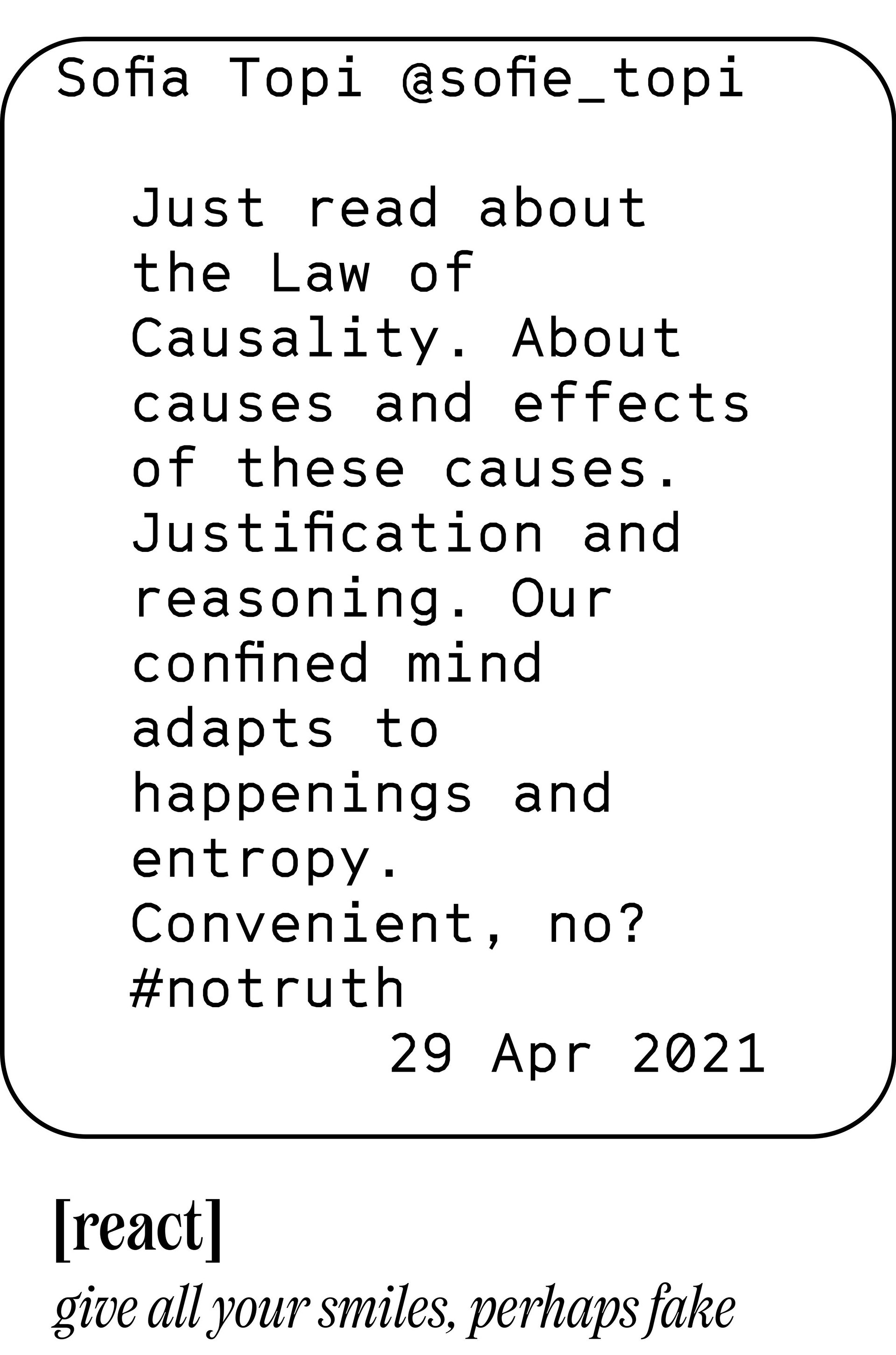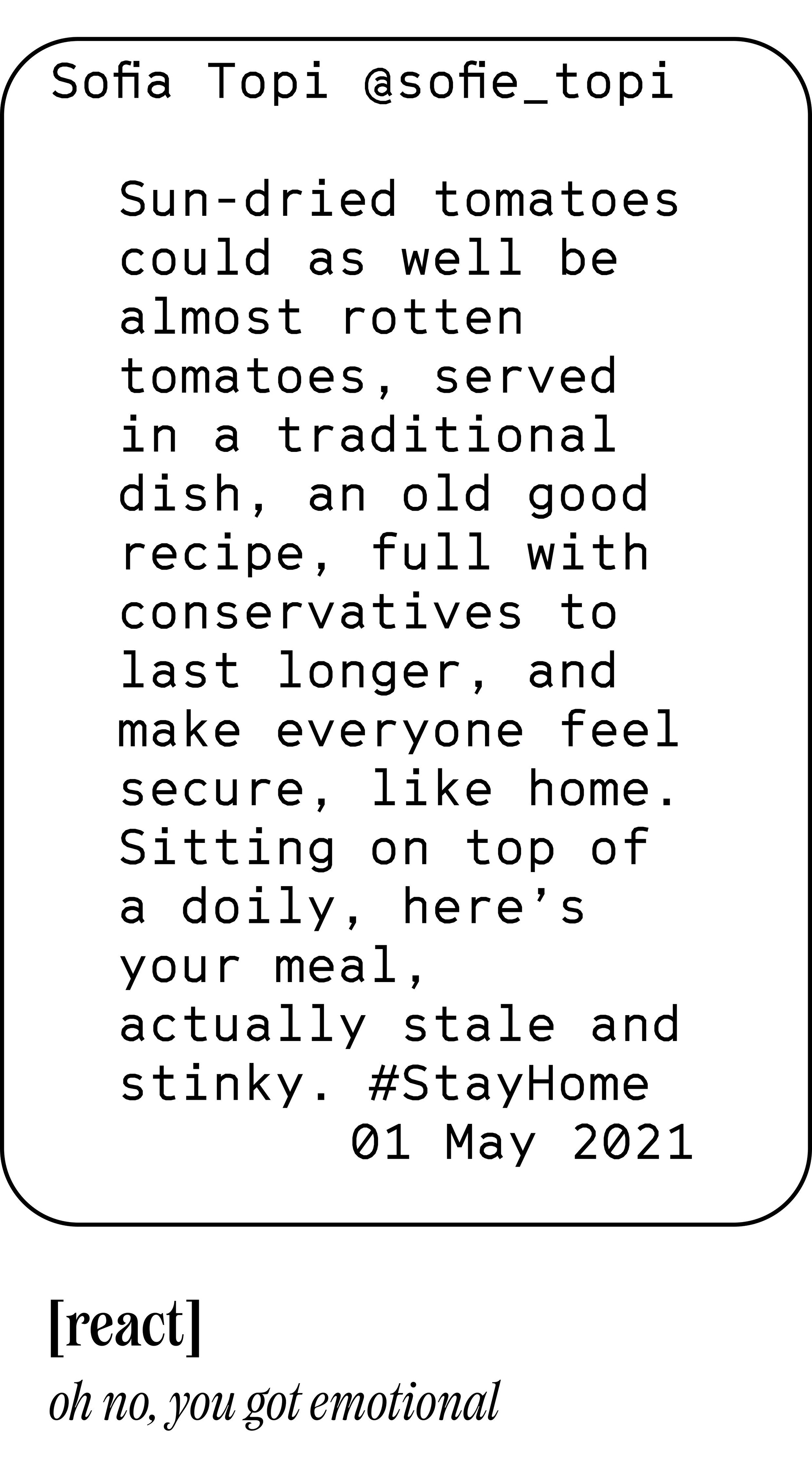Project title:
none of your concern
none of your concern
MA Graduation Project
Performative Installation
Text // Video // Prints // html, CSS, JS
Performative Installation
Text // Video // Prints // html, CSS, JS
Design Academy Eindhoven, 2021
supervisor: Antonis Pittas
supervisor: Antonis Pittas
In her project, “none of your concern”, Sofia Topi explores the dynamics between journalists, represented realities, and audience. She uses her experience of deciphering what was happening in her home country Greece, while being in the Netherlands. By adopting the identity she encounters in the news world, she takes a dual role (as a receiver of the news and a secondary mediator of them) to extremify the agency of published words and the linguistic vulnerability of individuals, to ultimately negotiate with the implications of hierarchies on voices in public.
The case study of investigation is the social movement #BoycottGreekMedia. A case on the increasingly biased mainstream Greek media and recent censorship of independent journalists on social media. It is a paradigm that magnifies the clash between ecologies of ideologies and power, and the primordial freedom of speech; thus, it is a call for a re-negotiation of the autonomy of doing, thinking, and feeling in public affairs.
The project is delivered by a printed issue (The hashtag issue, 250 copies) and a fictional twitter story, embossed with dissolved reactions and rendered in a video format.
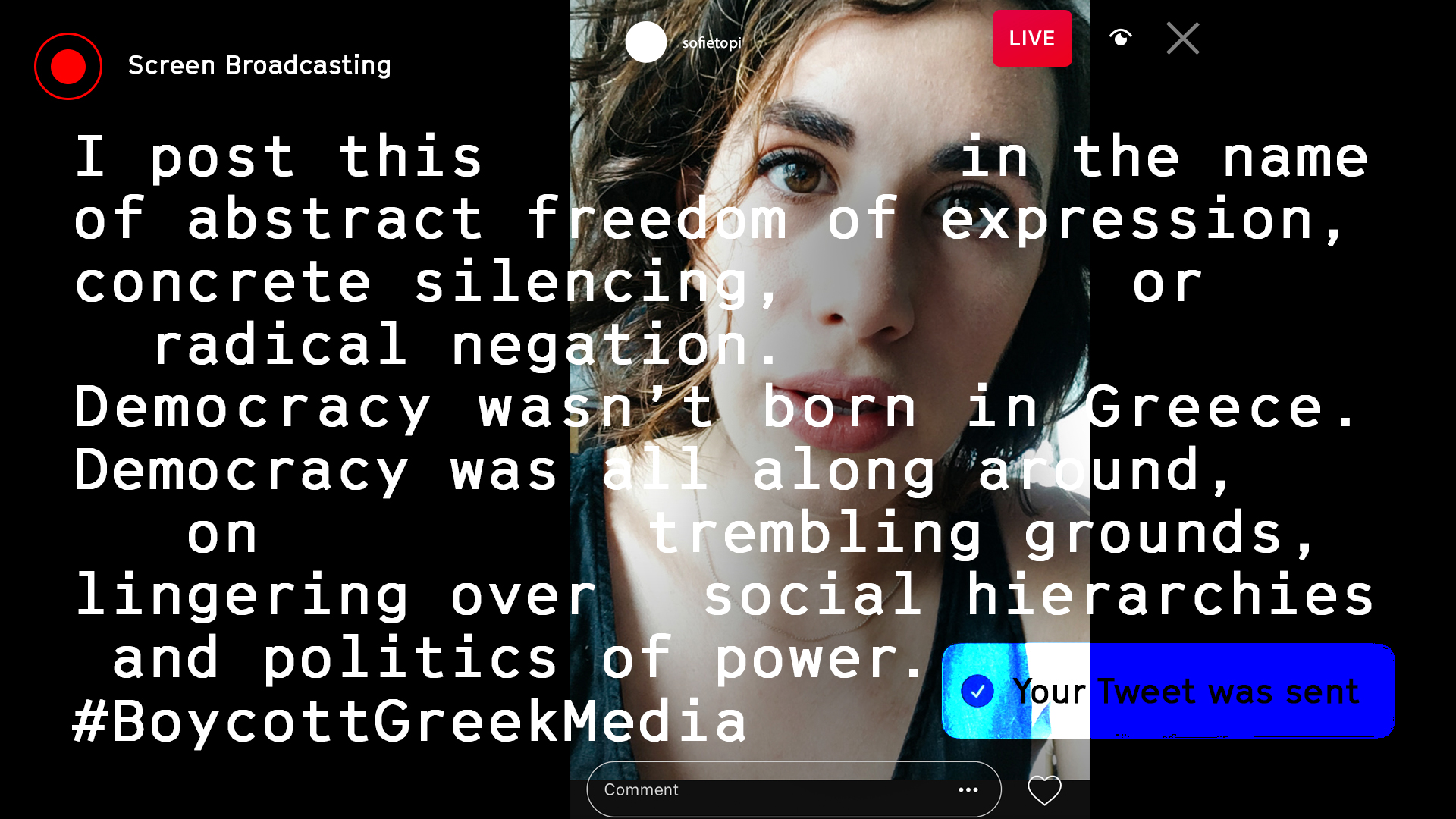
Editor’s note
This issue is situated within the context of trembling standards for freedom of expression and politics of silencing, framed by the social movement #BoycottGreekMedia (this is news on the run, old by now).
Social media is a space of conflict. A public dialogue on civil matters is taking place in a private space, with indications of being ruled by governments. Hashtags like #thisisacoup from 2015 to the #BoycottGreekMedia in 2021 are indicative of this public dialogue. But they also announce participation and involvement; the activation of social bodies. (It is not me claiming that, hashtag activism has a page in Wikipedia.)
The editor is me, preferably addressed as the collector, delighted to make your acquaintance.
In the time of the appearance of #BoycottGreekMedia and for three months, I led an extensive exercise of questioning what is going on in my home country, while being in the Netherlands. (A constructed axiom, everything has a reasoning.) I adopted the identity I found for myself yesterday, on a late night news report: female, late 20s, student, migrant, Greek. It can only make sense if I let you know, the trigger was curiosity; that, contrary to ignorance, complicates and muddles, selects and includes—yet never enough. Of course, I am a seed of my generation, the one of caring and scrolling (this is a reference of low-profile to the daily interactions in social media and newsletters). Absorbed by the condition of my capacity to understand the happenings around me, what is my role, and what is my agency in my socio-political status. And, among the many, to choose a reality (constructed may be, glittered with reactions, emotional and opinionated). In case you don’t know, I am linguistically vulnerable, same as you. For reactions can be weaponized, yet draining—equal to emotions.
Same as you, I am a social body. Here, I become a social actor. With this issue, I transform into a channel that filters the social meanings penetrating my body, and gives them back, altered by my viewpoint.
Back to this issue, the issue is the content. It consists of Facebook posts from February to April 2021, published by users (individuals) who are using social media to report their personal experiences of digital censorship and by users (individuals) who are critically speaking about this issue (the main issue, the repression of speech). The contributors to this issue were accidentally invited. Within the streams of posts, and because of my vulnerability, their words (at the time) stuck around. By speaking in public, they become the performers of their own reality—and I am watching.
Social media is a space of conflict. A public dialogue on civil matters is taking place in a private space, with indications of being ruled by governments. Hashtags like #thisisacoup from 2015 to the #BoycottGreekMedia in 2021 are indicative of this public dialogue. But they also announce participation and involvement; the activation of social bodies. (It is not me claiming that, hashtag activism has a page in Wikipedia.)
The editor is me, preferably addressed as the collector, delighted to make your acquaintance.
In the time of the appearance of #BoycottGreekMedia and for three months, I led an extensive exercise of questioning what is going on in my home country, while being in the Netherlands. (A constructed axiom, everything has a reasoning.) I adopted the identity I found for myself yesterday, on a late night news report: female, late 20s, student, migrant, Greek. It can only make sense if I let you know, the trigger was curiosity; that, contrary to ignorance, complicates and muddles, selects and includes—yet never enough. Of course, I am a seed of my generation, the one of caring and scrolling (this is a reference of low-profile to the daily interactions in social media and newsletters). Absorbed by the condition of my capacity to understand the happenings around me, what is my role, and what is my agency in my socio-political status. And, among the many, to choose a reality (constructed may be, glittered with reactions, emotional and opinionated). In case you don’t know, I am linguistically vulnerable, same as you. For reactions can be weaponized, yet draining—equal to emotions.
Same as you, I am a social body. Here, I become a social actor. With this issue, I transform into a channel that filters the social meanings penetrating my body, and gives them back, altered by my viewpoint.
Back to this issue, the issue is the content. It consists of Facebook posts from February to April 2021, published by users (individuals) who are using social media to report their personal experiences of digital censorship and by users (individuals) who are critically speaking about this issue (the main issue, the repression of speech). The contributors to this issue were accidentally invited. Within the streams of posts, and because of my vulnerability, their words (at the time) stuck around. By speaking in public, they become the performers of their own reality—and I am watching.
Ultimately, the issue is an attempt to valorize informal, spontaneous testimonies. Unauthorized voices provide a representative outline of what it feels like to be inside the event. It is an exposition of the intimacy of public affairs (before they get summarized and squeezed into the course of history, for students and academics to refer to). They are set against or in parallel with the great narratives of History, to allow its subtle details to be magnified; and to erup all the tints of the consensus to the factual (anyway limited and dull). I will leave this argument as such to stick to my point. Unauthorized voices suggest the importance of the burden of what happened. Unauthorized voices are indications of the sociopolitical civil environment and insights on what primary agents believe of the situation or how the situation was experienced.
I submit (and stand by it) that history equals interpretation; which means that history is a social process, built upon the autonomy and criticality of individuals.
In the case of #BoycottGreekMedia—a case of journalism in an acute crisis—, the access to a multitude of viewpoints is delicate and slippery. The contributors of the following content can be regarded as whistleblowers, witnesses in the public interest, that are denouncing corruption. They are users of social media platforms that have been attacked with warnings, blocks, or bannings from their online activities. They are victims of repressive cyber security laws that are (also) targeting government critics. The individuals are either journalists, photojournalists, or political critics that are regarded by the platform as not appropriate. Their voice was deemed against the government's interest, for uncovering human rights abuses. Legitimate criticism is characterized as “anti-state” and human rights defenders are silenced and prosecuted for “conducting propaganda against the state”. It is a turning point for freedom of speech, that of course, in the context of Greece, started 54 years ago.
Though the Greek constitution provides freedom of speech and press (art. 14), press freedom in Greece started to erode sharply during the economic and financial crisis of 2010-15. Stories were limited in the name of property and political ties, for financial sustainability. This, I reckon, is called self-censorship. It is an ongoing and escalating state, hardly ever illustrated.
I submit (and stand by it) that history equals interpretation; which means that history is a social process, built upon the autonomy and criticality of individuals.
In the case of #BoycottGreekMedia—a case of journalism in an acute crisis—, the access to a multitude of viewpoints is delicate and slippery. The contributors of the following content can be regarded as whistleblowers, witnesses in the public interest, that are denouncing corruption. They are users of social media platforms that have been attacked with warnings, blocks, or bannings from their online activities. They are victims of repressive cyber security laws that are (also) targeting government critics. The individuals are either journalists, photojournalists, or political critics that are regarded by the platform as not appropriate. Their voice was deemed against the government's interest, for uncovering human rights abuses. Legitimate criticism is characterized as “anti-state” and human rights defenders are silenced and prosecuted for “conducting propaganda against the state”. It is a turning point for freedom of speech, that of course, in the context of Greece, started 54 years ago.
Though the Greek constitution provides freedom of speech and press (art. 14), press freedom in Greece started to erode sharply during the economic and financial crisis of 2010-15. Stories were limited in the name of property and political ties, for financial sustainability. This, I reckon, is called self-censorship. It is an ongoing and escalating state, hardly ever illustrated.
Even so, here is my take on the Greek political history of censorship (or disturbance of Democracy in Greece, as I prefer to call it), in fragments and in captions:
“Greece is sick. We have put her in plaster. She shall remain in plaster until she recovers”, the infamous statement by the Greek dictator.
[1967—Far-right military junta, lead by George Papadopoulos: total control of media and violent silencing of voices against the government]
The #riots mobilize crowds around the country and the world.
[2008—right-wing government: New Democracy (liberal-conservatism) is silencing police violence in mainstream media. The first worldwide impact of social media on changing opinion against police tactics was recorded.]
#ThisIsACoup: social media diplomacy has now tangible effects.
[2015—left-wing government: SYRIZA (Democratic socialism) is dusting the opinion of citizens. The international social media community supports the democratic will of the politically confused Greek people.]
Social media footage of police brutality takes a beating on mass media.
[2021—right-wing government: New Democracy (liberal-conservatism): open tactics of media manipulation by the government. Repetitive reactions against mass media propaganda and misinformation spread rage on citizens.]
“The way social media work today and the algorithms of the big platforms they use actually reproduce and reward whatever views they may already have. They create barriers, barriers of tension, not barriers of dialogue. Barriers that feed back on the stereotypes they already have. On the one side and on the other side. And that is bad for our democracy, it is bad for the level of our dialogue. Because in this way young people are trapped in their views without developing their critical thinking, without questioning what they see, what anyone can serve them.”
PM of Greece/Member of the European Council, Parliament speech (excerpt), March 12, 2021
In the middle of March 2021, the Prime Minister of Greece during his speech in the parliament claimed that, “Social media will hurt democracy and dialogue.” In the meantime, social media, like Facebook and Instagram, were flooded with sensitive posts, and reports on deleted posts, account suspension, and account blocks. Most of them were coming from journalists, photojournalists, and political critics with open accounts to the public.
The present issue is a testimony that these posts happened.
Sofie Topi
“Greece is sick. We have put her in plaster. She shall remain in plaster until she recovers”, the infamous statement by the Greek dictator.
[1967—Far-right military junta, lead by George Papadopoulos: total control of media and violent silencing of voices against the government]
The #riots mobilize crowds around the country and the world.
[2008—right-wing government: New Democracy (liberal-conservatism) is silencing police violence in mainstream media. The first worldwide impact of social media on changing opinion against police tactics was recorded.]
#ThisIsACoup: social media diplomacy has now tangible effects.
[2015—left-wing government: SYRIZA (Democratic socialism) is dusting the opinion of citizens. The international social media community supports the democratic will of the politically confused Greek people.]
Social media footage of police brutality takes a beating on mass media.
[2021—right-wing government: New Democracy (liberal-conservatism): open tactics of media manipulation by the government. Repetitive reactions against mass media propaganda and misinformation spread rage on citizens.]
“The way social media work today and the algorithms of the big platforms they use actually reproduce and reward whatever views they may already have. They create barriers, barriers of tension, not barriers of dialogue. Barriers that feed back on the stereotypes they already have. On the one side and on the other side. And that is bad for our democracy, it is bad for the level of our dialogue. Because in this way young people are trapped in their views without developing their critical thinking, without questioning what they see, what anyone can serve them.”
PM of Greece/Member of the European Council, Parliament speech (excerpt), March 12, 2021
In the middle of March 2021, the Prime Minister of Greece during his speech in the parliament claimed that, “Social media will hurt democracy and dialogue.” In the meantime, social media, like Facebook and Instagram, were flooded with sensitive posts, and reports on deleted posts, account suspension, and account blocks. Most of them were coming from journalists, photojournalists, and political critics with open accounts to the public.
The present issue is a testimony that these posts happened.
Sofie Topi
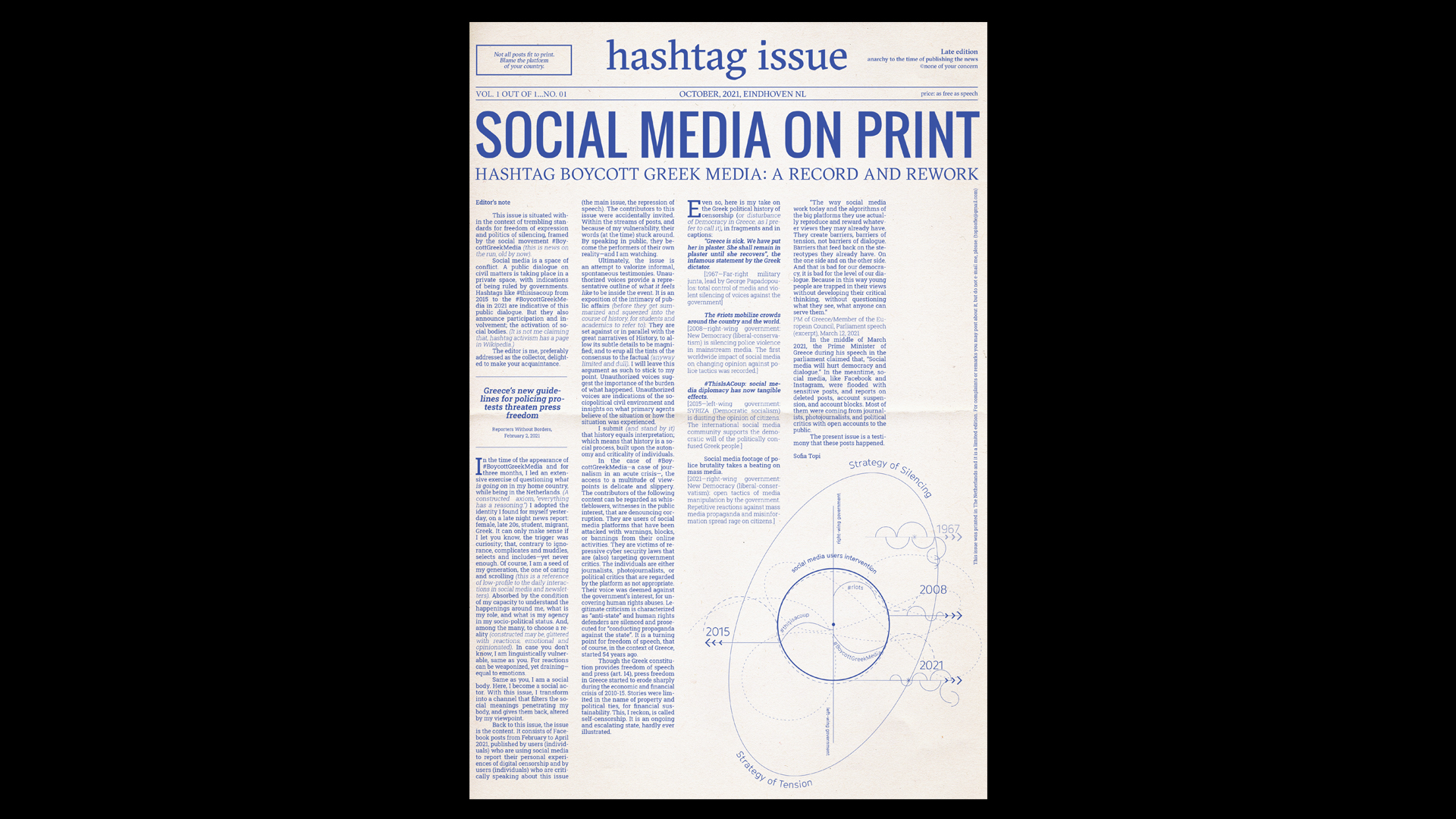



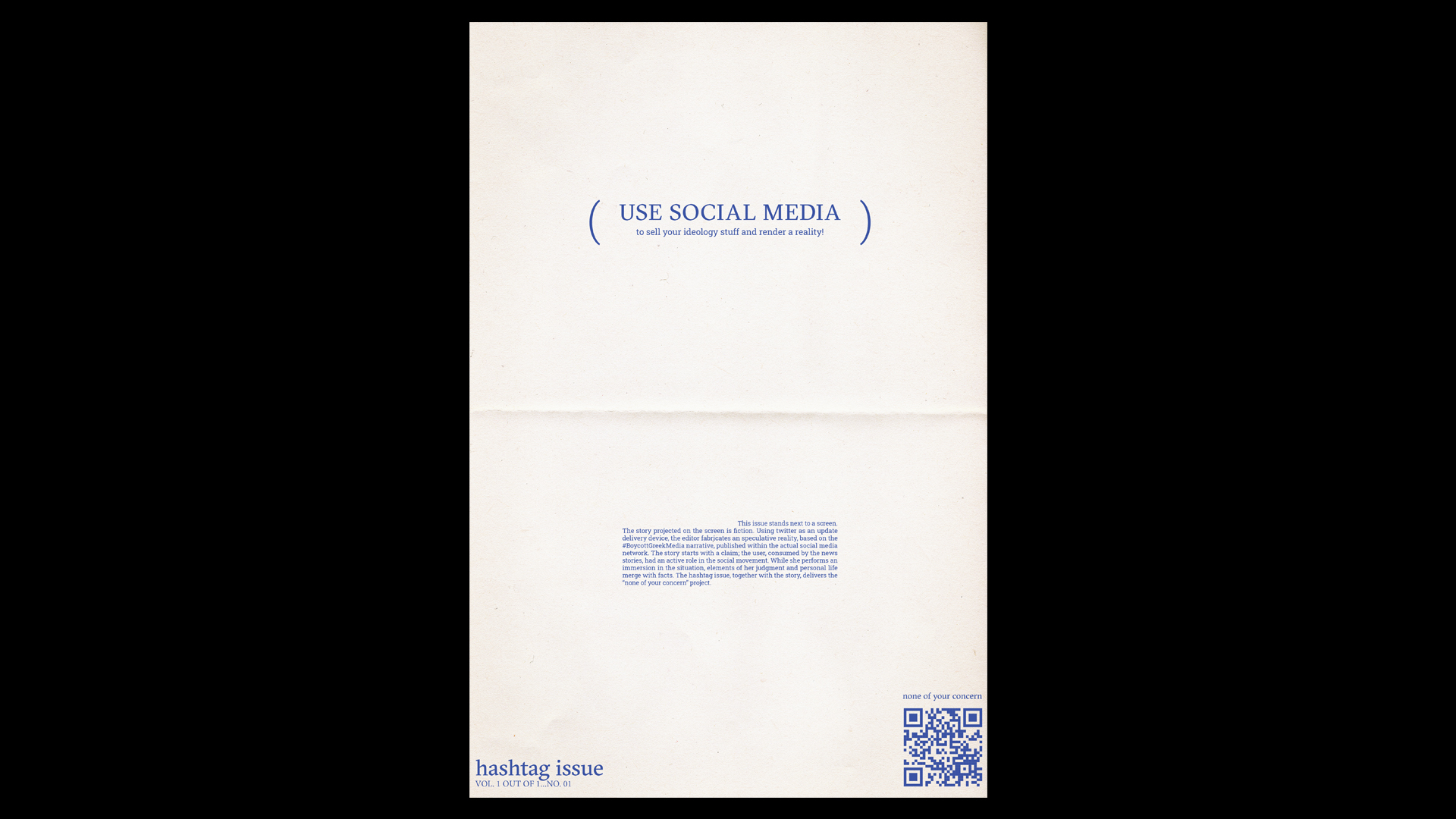
The following is a strictly fictional story. It starts with a claim; that I, same as you, I am a spectator, possibly a hyper spectacle, holistically immersed in the news stories I read. Using a social media platform as an update delivery device, we can fabricate an imaginary reality. In this case, based on the #BoycottGreekMedia narration published by other users. While I perform an immersion in the situation, elements of my judgment and personal life merge with facts. On which I react.
This is my hyper spectacle, told in 21 tweets.
This is my hyper spectacle, told in 21 tweets.
